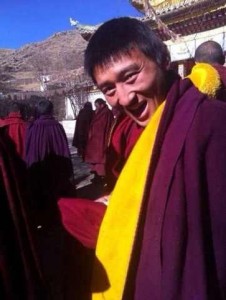
A monk from Kirti Monastery has become the 128th Tibetan to carry out self-immolation protest against Chinese government’s repressive policies in Tibet since 2009. In his last note, Lobsang Palden, 20, has called for love and harmony to prevail over hatred and repression:
“[Y]ou should be able to [live in] harmony with your neighbors – people of the world in general and the Chinese in particular. This is because, if there is love and harmony, we will be able to air our views, no matter what they are and to whom we want to air them.”
Lobsang Palden, a monk from Kirti Monastery in Ngaba (Ch: Aba) County in Tibet’s northeastern province of Amdo self-immolated on 16 March 2014 at around 11:40 am, according to sources from inside Tibet.
The self-immolation occurred at ‘Martyrs’ Street’, which was named so by locals after a series of self-immolation protests was staged on this stretch of the road in Ngaba town.
“At the Martyrs’ Street, Lobsang Palden poured kerosene over his body and struck a match, and then started walking a few steps raising slogans against the Chinese government,” said the source.
A huge contingent of the Chinese special paramilitary police immediately arrived at the scene and extinguished the fire that was consuming Lobsang Palden’s body.
The police grabbed his body and took it away in a small vehicle to prevent local Tibetans from accessing it and performing funeral rites. It remains unknown whether Lobsang Palden survived and where the Chinese police took his body.
In a massive defiance of the Chinese government and to express solidarity to the self-immolator and his family, the local Tibetans in the area have decided to close down their shops and restaurants. Fearing the self-immolation will trigger further protests by Tibetans, the Chinese government dispatched a large contingent of uniformed and plainclothes police officers to enforce strict control in the area.
16 March marks the sixth anniversary of the 2008 Ngaba Massacre, when Chinese security forces killed many young and old Tibetans, both monastic and lay, as they called for Tibetan freedom.
This is the fourth time that Tibetans have marked the anniversary by committing self-immolation protests at the ‘Martyrs’ Street’. On 16 March 2013 Lobsang Thokmey committed self-immolation on 16 March 2012; Lobsang Tsultrim committed self-immolation; and on 16 March 2011 Phuntsog committed self-immolation.

Lobsang Palden hails from Asher Tsang household in Meruma Village, located in Ngaba County in Ngaba Tibetan and Qiang Autonomous Prefecture, Sichuan Province. He became monk at a young age at Kirti Monastery where he studied Buddhist dialectics and attained the class of Dus Dra (Fundamentals of Logic).
Palden is survived by his mother Namkho, stepfather Sherab, and a younger brother, also a monk at Kirti Monastery.
TCHRD received a copy of the final note penned by Palden Gyatso before he set himself on fire. The English translation of the final testament is below:
Dear mother, father and fellow brothers and sisters,
What I have to say is this: if there is genuine unity and solidarity among the Tibetan people, then it is right. Otherwise, if we hate each other, we will suffer losses. Needless to say that if we [show] genuine solidarity to each other, we will triumph. Similarly, no matter what actions we pursue, it is very important that we think it over – rather than pursuing it foolishly. If you are a student, you should study well; if you are a father or mother, you should be able to advise [your children] well; if you are an entrepreneur, you should be able to benefit both yourself and the others, and take care of nomads, peasants and the parents. Moreover, you should be able to [live in] harmony with your neighbors – people of the world in general and the Chinese in particular. This is because, if there’s love and harmony, we will be able to air our views, no matter what they are and to whom we want to air them.
I have often said that we must figure out what our personal and public interests are, and that no matter what actions we pursue, it would be right if we pursue them by keeping into account the public interest and public unity. This is because, the basis of happiness, is public interest and unity.
My mother, my aunt, my uncle, my in-laws, my cousins, nieces, sisters, my teachers and fellow schoolmates – all those who have tended me with love and care – I pray that success bless their lives and hope that they serve the public interest. My mother – you have reared us with love and care. We have grown up on your sweat and blood. We gained much happiness in your lap. You have been very generous in your giving. Because of your love and compassion, we haven’t suffered. Everything that we have owes to your sustenance. I express my deep gratitude to you mother; my deep gratitude to you mother. So many gratitude I have to express to you mother, but due to the [lack of space], I am stopping here. There must be some errors in my writing, for which I extend my apology.
— Lobsang Palden
